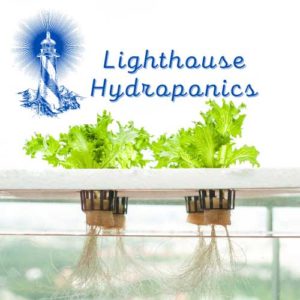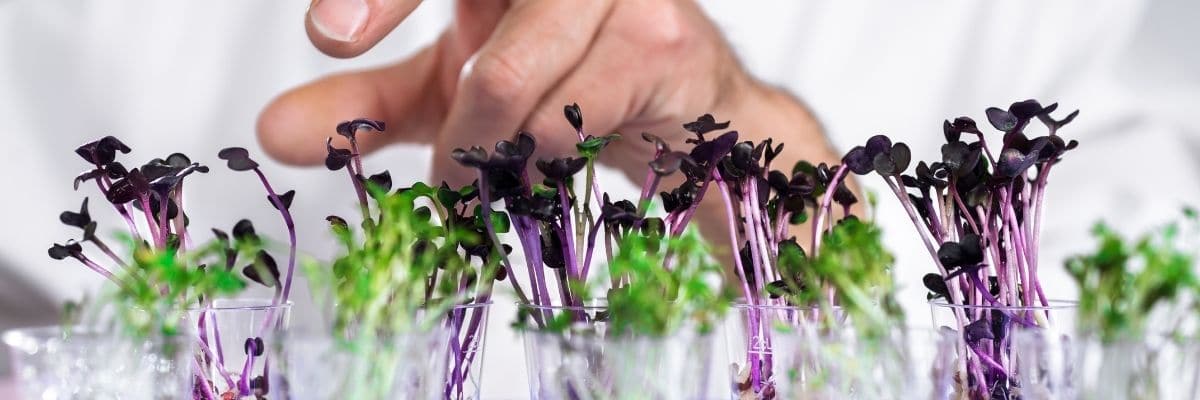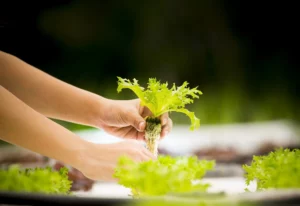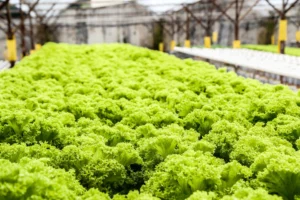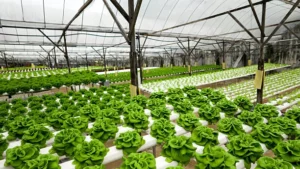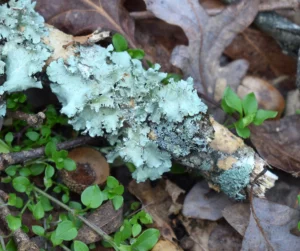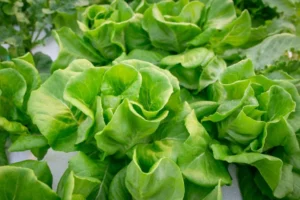People who are interested in hydroponics are often interested in organic agriculture, for either health, nutritional reasons, or for environmental values. If you like me are interested in both and find them important in your life; or if you’re debating between hydroponic vs organic, then the question can hydroponics be organic is only natural.
Is Hydroponic An Organic Or Inorganic Practice?
The simple answer is that hydroponics can be either organic or inorganic.
“Organic” means that the plants are grown without the use of synthetic chemicals, especially in terms of pest control.
“Hydroponics” means growing plants in water-based nutrient solutions with no soil.
However organic farmers are permitted to use some pesticides and fertilizers, and it is the choice of which pesticides and fertilizers, and their relative amount that determines if the garden or farm is organic.
According to the National Gardening Association, most hydroponic growers use synthetic fertilizers and pesticides, but they can also choose to use organic ones if they wish.
The Environmental Advantage of Organic Hydroponics
Because of the nature of hydroponics, it is possible to recycle water more efficiently than with traditional soil-based growing.
This means that hydroponics can be more sustainable and less wasteful than organic farming, which may appeal to some organic growers. Furthermore, hydroponic organic farms have the advantageous opportunity to avoid the use of compost, which has vast environmental benefits, such as reducing greenhouse gas emissions from fields, since water-based nutrient solutions do not release greenhouse gases.
Is Hydroponic As Healthy As Organic?
Hydroponics allows for more control over the nutrients that are provided to plants, which allows gardeners and farmers to choose exactly the amount and type of nutrients added in order to keep the plant as nutritious as they like.
Plants grown without soil often have smaller root systems, which may reduce the plant’s ability to absorb minerals naturally found in soil.
However, hydroponics has been shown to increase the levels of antioxidants and nutrients in plants. If you’re concerned about the nutritional value of your organic food then growing organic hydroponically can help address that concern.
Is Hydroponics Less Expensive than Organic?
Depending on your definition of organic, the cost of hydroponic foods may be substantially cheaper than organic foods.
Estimates indicate that a plant grown with organic methods in commercial quantities will cost up to twice as much to produce as a plant grown in commercial hydroponic conditions.
How Do You Make Organic Hydroponics?
There are some practices that are exclusive to organically grown plants that cannot be replicated in hydroponics, even with organic fertilizers or pesticides. These include building manure into the soil, composting plant matter before it is spread on fields, and leaving fields fallow for periods of time.
However, there are organic hydroponic methods available. For example, some organic fertilizers release chemicals slowly so they do not wash away quickly as conventional non-organic types can.
Some hydroponic farmers grow certain fish in pools adjacent to the water reservoir from which their crops draw their nutrients. The fish excrements are then filtered and utilized as organic nutrients for the hydroponically grown crops.
Best Organic Hydroponic Nutrients
These days it is easy to find off-the-shelf organic nutrients for hydroponic gardens and greenhouses.
A search on Amazon can show you the variety of organic hydroponic nutrients available on the market click here to see a list of 4-5 stars rated organic hydroponic fertilizers on Amazon (sorted from best to less by customer reviews).
At the time of writing these lines, there are approx. 400 with 4-5 star ratings that fit this description.
Are Organic Hydroponic Vegetables Nutritious?
To ensure that your hydroponic vegetables are even richer in nutrients, you can choose to use organic fertilizers.
Organic fertilizers release their nutrients slowly, allowing them to be absorbed by the plant over a longer period of time. This is beneficial if you want your plants’ roots to grow deep and wide, which will allow your plant to absorb more nutrients.
Some organic fertilizers are made from byproducts that are normally thrown away, such as tomato vines, fish excrements, and seaweed. Using these ingredients allows gardeners to re-purpose products that would otherwise go to waste, saving money for both growers and the local economy. As well as being sustainable, using organic fertilizers in hydroponics.
As with all hydroponics produce, the nutritiousness of the vegetables is determined by the grower and the growth environment. If you keep optimal levels of pH, EC, temperature, and nutrients, the vegetables (and indeed fruits) you grow will be highly nutritious.
Can Hydroponics Be Certified Organic?
Organic certification is not based on whether or not your plant was grown in soil. Instead, the certification is granted if the growth conditions for that plant meet certain standards.
For example, it’s acceptable to use organic hydroponics methods when the nutrients are derived from natural sources and are not synthetic chemicals.
To qualify as an organic farm in the U.S, you must grow your plants in an environment that meets the conditions outlined in the USDA’s National Organic Program standards.
Organic certification is just one of many methods that can be used to prove the purity of your hydroponic vegetables.
Conclusion
It’s possible to grow organic hydroponic vegetables with the correct equipment and nutrients.
In fact, there are a number of ingredients you can incorporate into your hydroponics system that would be considered strictly organic under the guidelines set out by the United States Department of Agriculture (USDA).
It is mostly a matter of choice whether or not to turn your hydroponic garden into an organic-hydro-garden and enjoy the best of both worlds.
